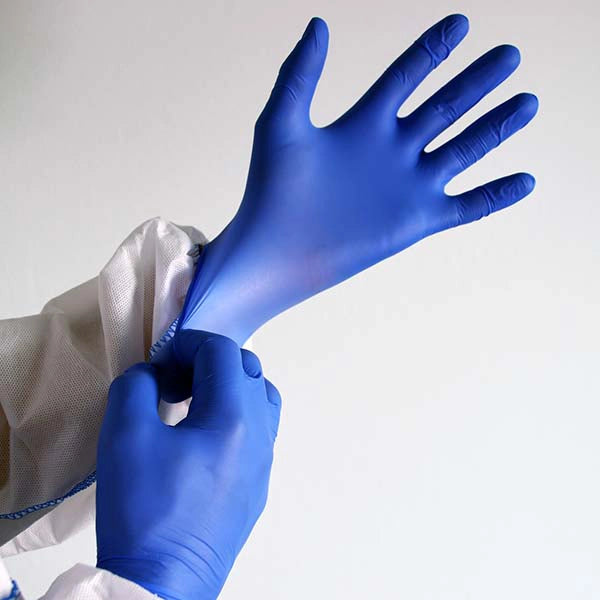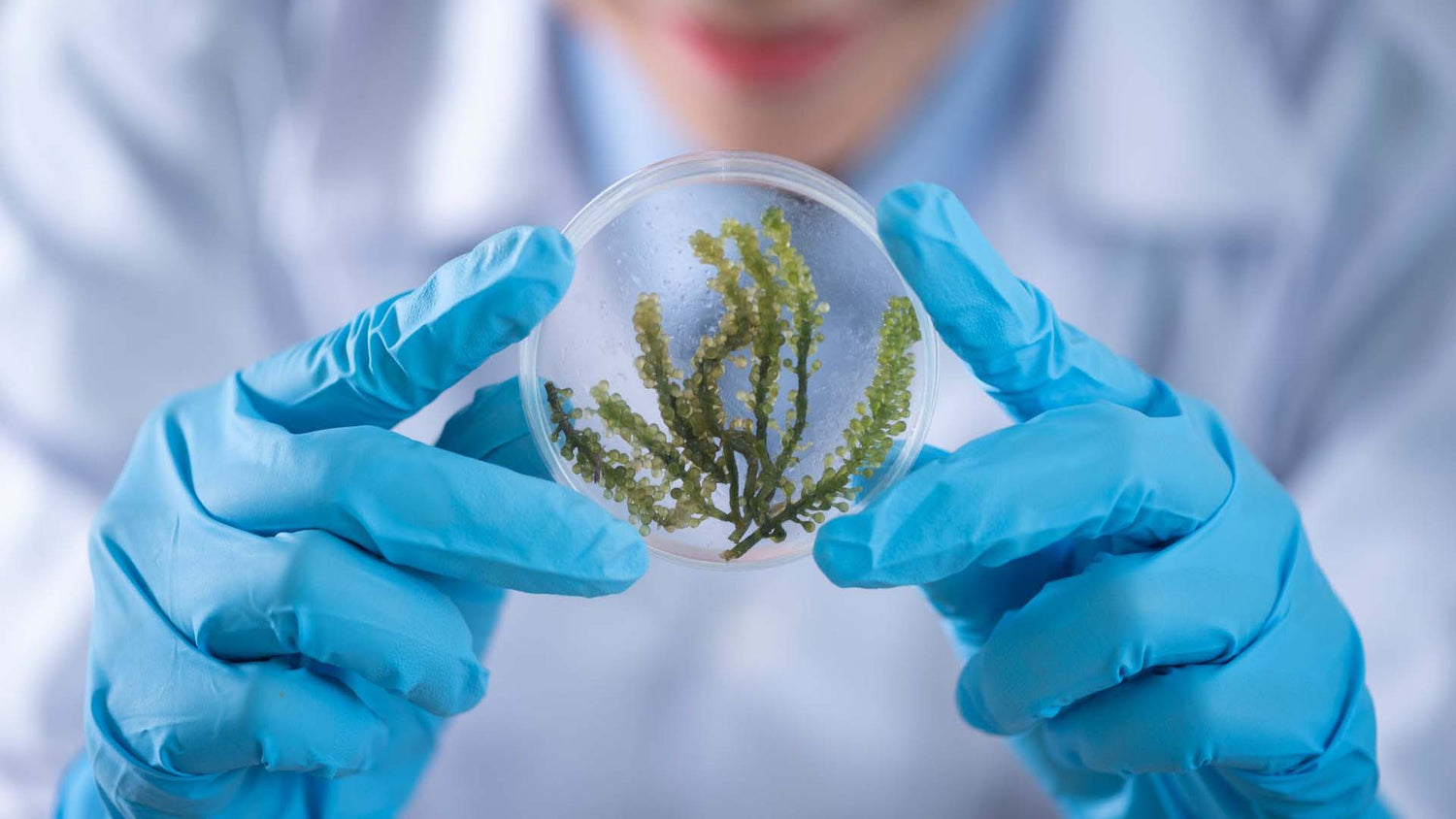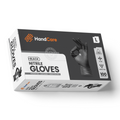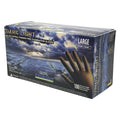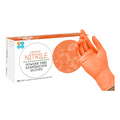Finding quality nitrile gloves is more complicated than picking the correct size. There are about half a dozen fabulous places to find these gloves, and their many seemingly minor differences can make a huge difference in practice. Below, we’ll look at how the best nitrile gloves on the market measure up.
How do they compare in terms of thickness, fit, and user dexterity? Which gloves are more suitable for which tasks? What’s the best brand? Nitrile gloves come in so many varieties that there are no simple answers.
That’s because the best disposable nitrile gloves are ultimately the ones that meet the needs of the task at hand, which is why we’ll also discuss the gloves' usefulness in various industries and settings.
At a glance:
10 Best Nitrile Gloves: How to Choose the Right One?
When it comes to hand protection, nitrile gloves have become a popular choice for various industries, including healthcare, food service, and manufacturing. Known for their superior durability, puncture resistance, and chemical protection, nitrile gloves offer a versatile and reliable solution for many applications. However, with a wide range of options available on the market, selecting the best nitrile gloves can be a daunting task.
This guide aims to simplify your decision-making process by highlighting the top 10 nitrile gloves and providing insights on what to consider when choosing the right pair for your needs.
1. HandCare Exam Grade Black Nitrile Gloves
👉 Shop Black Nitrile Gloves now and save up to 50%
HandCare Exam Grade Black Nitrile Gloves offer an unmatched balance of price, performance, and comfort. They’re latex-free, powder-free, and 100% nitrile. People with latex allergies or skin sensitivities can use them confidently and enjoy all the protection demanded of the best nitrile disposable glove.
HandCare is committed to quality, so these gloves are rigorously tested to meet or exceed American Society for Testing and Materials (ASTM) standards. But quality is just one facet of why our gloves are the best nitrile gloves for most situations.
Thickness: At 4 mil, HandCare Black Nitrile Gloves ride the line between optimizing for dexterity or protection. Their particular balance of grip, protection, and comfort synergize, making these gloves suitable for most circumstances.
Fit: These disposable nitrile gloves are made in four sizes: S, M, L, and XL. That variety allows them to provide a snug yet comfortable fit on hands of all sizes. As they are ambidextrous, anyone can use them.
Dexterity: Combining a specialized fit with 4 mil thickness, HandCare black nitrile gloves provide great tactile sensitivity. That makes them perfect for doing complex tasks with your hands — without your protective gear getting in the way.
Ideal Use: Workers in a wide variety of industries, including first responders, food processors, automotive workers, cleaners, tattoo artists, pest control professionals, veterinary professionals, and healthcare workers, rely on these protective gloves every day.
These disposable gloves are exam-grade. They are lauded by doctors from leading hospitals like Johns Hopkins and Northwestern as exemplary of affordable, high-quality, non-latex gloves. If black nitrile gloves don’t provide the contrast you need, HandCare also makes them in blue.
2. Dark Light Black Nitrile Gloves
👉 Shop Black Nitrile Gloves right now and save up to 50%
The best black nitrile gloves brand varies from one circumstance to the next, but Dark Light Black Nitrile Gloves are great when you need a much heavier-duty glove. Like other gloves from Gloves.com, they’re powder-free and latex-free, making them safe for people with latex allergies or sensitive skin. But how do they stack up among the rest of the best nitrile disposable gloves?
Thickness: More than twice as thick as the HandCare gloves, these gauntlets are a prime example of 9 mil nitrile gloves. They’re incredibly puncture-resistant and exceedingly difficult to rip or tear.
Fit: A powder-free design ensures a snug fit true to the variety of sizes in which these gloves come. Many people report they’re comfortable to wear for long periods.
Dexterity: Thick nitrile gloves like these will never allow users to be as agile as when using something thinner, but Dark Light gloves still allow a good grip and hand feel for many kinds of tasks.
Ideal Use: Dark Light gloves are best used when extra protection from rips, tears, and hazardous chemicals is critical. They’re popular in auto, machine, and welding shops for that reason. Some people even use them when gardening, given the excellent puncture resistance they offer.
Because they contain extra layers of material, Dark Light Black Nitrile Gloves are a little pricier than the gloves produced by many of their competitors. But the value for the price is still relatively high in situations where heft is helpful — enough to easily make Dark Light the best nitrile gloves brand for thickness.
3. Venom Steel Industrial Nitrile Gloves
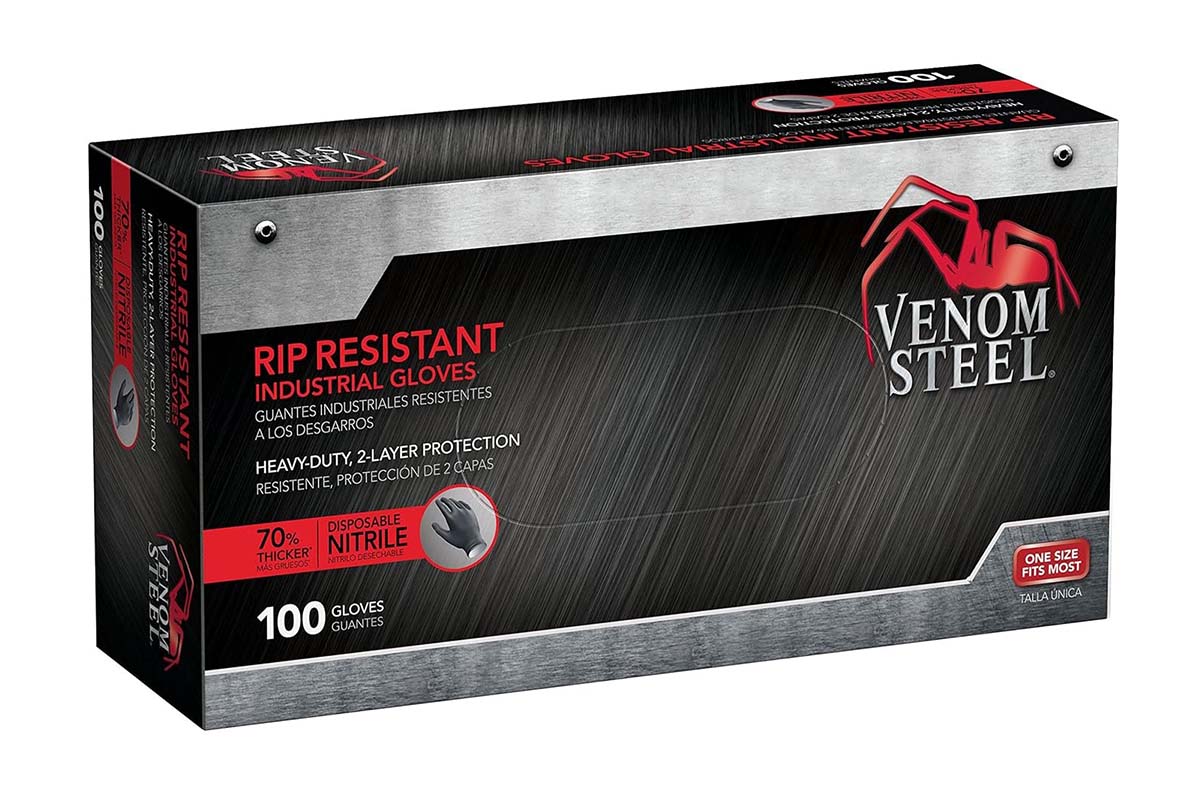
People trying to find good heavy-duty disposable hand protection often turn to Venom Steel Industrial Nitrile Gloves. Although they’re not the thickest, they have several unique qualities that ensure they go above and beyond to protect. How do they compare with other nitrile gloves brands?
Thickness: Venom Steel gloves are 6 mil thick, about 50% thicker than most multipurpose gloves. These gloves are built to withstand over ten pounds of pressure between the black outer layer and the white underlayer. That makes them resistant to slashes, rips, and tears, and when punctures do happen, the underlayer makes them more visible.
Fit: Venom Steel claims that "one size fits most.” That does seem to be the case, with most reviewers praising the comfortable and accurate fit across diverse hand sizes.
Dexterity: These gloves are thicker than many of the best nitrile disposable gloves, slightly decreasing users’ dexterity. However, they still allow decent hand movement and a reasonably sensitive feel. Many nitrile gloves brands shy away from medium-thickness designs because they’re so niche, but Venom Steel makes them its forte.
Ideal Use: Venom Steel nitrile gloves are popular in a wide variety of industries. They’re used for automotive work, construction, plumbing, food service, landscaping, and on many other types of job sites.
Venom Steel Industrial Nitrile Gloves command a relatively higher price than other nitrile gloves. If you have the cash to spare, their exceptional durability and protection make them a worthwhile investment for those who prioritize safety and comfort.
4. Wostar Multi-Purpose Nitrile Gloves

Wostar Multi-Purpose Nitrile Gloves have a thinner design, making this an excellent nitrile glove brand to choose when you need to maintain tactile sensitivity. Even though they’re a bit thinner, they provide a solid line of defense against punctures and cuts. But how do they stack up against other contenders for the best nitrile disposable gloves?
Thickness: Wostar’s nitrile gloves are produced in a 4 mil thickness. Many disposable nitrile gloves aim to achieve such a nice balance of protection, comfort, and sensitivity.
Fit: As powder-free gloves, some people find these slightly tricky to put on. Once you get past that, their powder-free nature allows them to better conform to their users’ hands and allow normal movement.
Dexterity: The thin-leaning design of the Wostar nitrile gloves means they allow good tactile sensitivity and hand movement, making them ideal for tasks requiring a delicate touch.
Ideal Use: Since these nitrile gloves are so thin, they’re unsuitable for high-temperature environments or handling certain hazardous chemicals. Still, the excellent balance of protection and hand feel means they’re helpful in more situations than you might expect.
Wostar’s Multi-Purpose Nitrile Gloves are slightly more expensive than the products from many of its competitors, especially compared to the top wholesale suppliers for nitrile gloves. Still, the balance they offer between thinness and protection can make them worthy of consideration by anyone leaning towards a multi-purpose glove.
5. The Safety Zone Nitrile Gloves
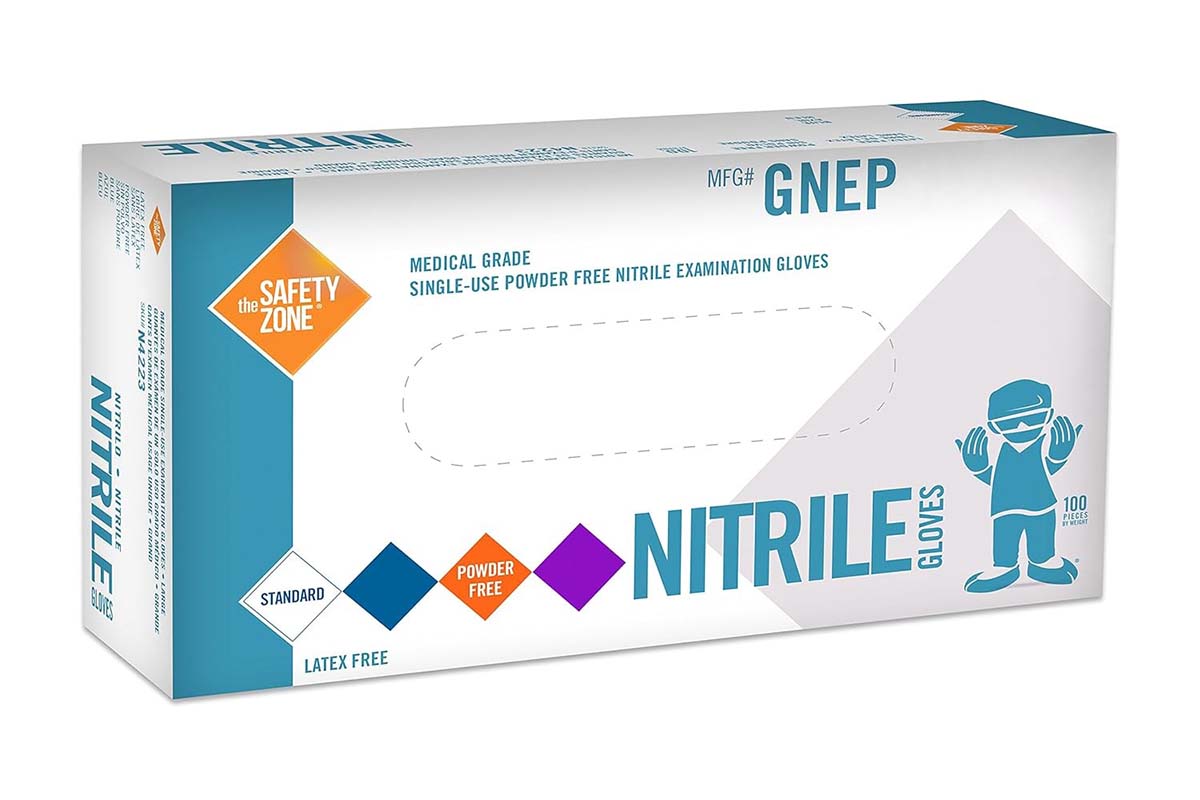
Like many of the best disposable nitrile gloves, The Safety Zone’s gloves are built to provide multipurpose, everyday protection. They have a thinner design intended to maintain agility and comfort in exchange for a small durability tradeoff. Here's a breakdown of what you can expect from these powder-free gloves:
Thickness: These gloves come in a thickness of 3 mil. That’s considerably thinner than most nitrile gloves but still enough to provide respectable resistance to punctures and chemicals.
Fit: The thin design of these gloves allows them to fit like a second skin, making them ideal for delicate tasks where hand coordination matters. Being available in many sizes keeps their fit equally good.
Dexterity: The thinness of these nitrile gloves allows for great hand movement. Just as importantly, their exteriors are finely textured at all points of contact, lending them a good grip for delicate tasks or small objects.
Ideal Use: Since they’re on the thinner side, these gloves are likely best suited to lighter tasks like food preparation, cleaning, pet care, hair coloring, or basic medical exams.
When you’re trying to find the best brand, the relative value of nitrile gloves starts to differ only in specific situations. Nitrile gloves brands like the Safety Zone produce products designed to prioritize dexterity and fit — if the idea of a glove that fits like a second skin appeals to you, they might be a good choice.
6. Dre Health Nitrile Exam Gloves

The best disposable nitrile gloves must balance several factors. Health Nitrile Exam Gloves are a good choice if you're after a powder-free nitrile glove that delivers on quality and performance. Here's how they compare:
Thickness: Like The Safety Zone’s gloves, Dre Health’s gloves are relatively thin, clocking in at 3 mil. However, their high-quality materials allow Dre Health disposable nitrile gloves to maintain decent puncture and cut resistance.
Fit: Dre Health's gloves’ fitting tends to run small compared to other disposable nitrile gloves, so expect a snug fit with these. That tightness might be okay for some applications but could be an issue for longer-term use.
Dexterity: The snug fit and 3 mil thickness of these gloves allow for easy hand movement and excellent tactile acuity, which makes them a good fit for performing delicate tasks.
Ideal Use: Dre Health’s gloves are suitable for a range of functions, but like other thinner disposable gloves, they’re better suited for lighter-duty work where vinyl gloves won't cut it — think hair dyeing, basic medical exams, and food handling, especially when trying to avoid the allergy hazard of traditional vinyl gloves.
Dre Health Nitrile is arguably the best nitrile gloves brand for exam PPE. If you don’t mind a tight fit, these gloves offer decent value combined with a puncture and cut resistance that’s quite impressive, given their diminutive thickness.
7. ASAP Orange Nitrile Gloves
👉 Shop now ASAP Orange Nitrile Gloves and save up to 50%
For anyone trying to find the best brand, nitrile gloves can start to look similar. ASAP Orange Nitrile Gloves are another incredibly popular latex-free and powder-free option, but it’s not just their color that helps them to stand out:
Thickness: As 5 mil thick gloves, these are built to deliver modestly above-average durability and protection — just not so much that the sacrifice of some hand-feel will become an impairment.
Fit: ASAP Orange Nitrile Gloves are made in a range of sizes, from S to XL, ensuring nearly everyone can find a great fit. The result is snug and true to size.
Dexterity: User dexterity is very minorly impaired compared to 3 mil or 4 mil gloves, but people in these gloves can still enjoy a firm grip and excellent tactile sensitivity.
Ideal Use: The bright orange color of these gloves provides high visibility for added safety in situations like food service and the construction industry. Their balance between feel and durability makes them an excellent choice for household cleaners, medical professionals, lab technicians, automotive workers, and people exploring many other use cases.
A nitrile glove brand like ASAP focuses more on delivering relatively affordability with decent thickness and protection. If you need something a little thicker but don’t want to compromise on price, these might be the right nitrile gloves for you.
8. Gloveworks Nitrile Disposable Gloves
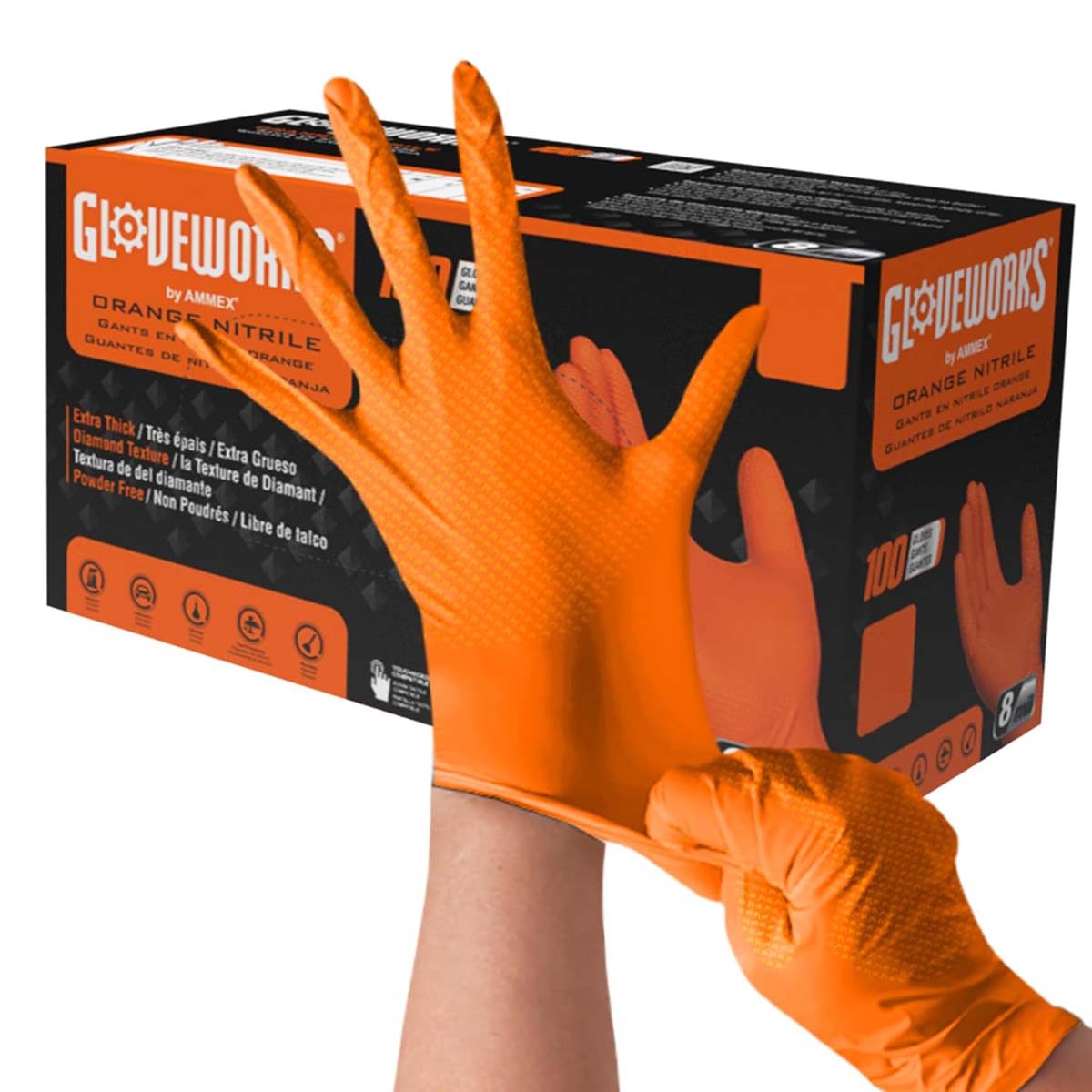
Another bright orange nitrile glove model, Gloveworks Nitrile Disposable Gloves are extra heavy-duty. In addition to their thickness, their design uses a unique coating that helps them stand out. Here's how they stack up:
Thickness: With a healthy 8 mil thick build, these are among the thickest nitrile gloves on the market. The extra material grants extreme resistance to cuts and tears compared to virtually all other nitrile gloves.
Fit: These gloves come in various sizes and fit mostly true to size, if a little snug. Many people find they’re easy enough to put on but can require extra effort to remove safely.
Dexterity: While Gloveworks nitrile disposable gloves’ thickness means they may not provide as much touch sensitivity as a lighter pair, they sport a unique bumpy-textured coating that improves users’ grips. That addition keeps their dexterity high relative to their impressive thickness.
Ideal Use: Favored by construction workers, nail technicians, and home DIYers, these gloves can also handle messy tasks like dealing with motor oil, paints, and varnishes, thanks to their dense design.
Nitrile gloves brands that make thicker gloves like this always charge more because they use more material. But despite the cost, their superior durability and excellent grip make them worthwhile for those who need disposable gloves that can withstand heavy-duty tasks.
9. ProCure Nitrile Gloves

ProCure Nitrile Gloves are among the best nitrile disposable gloves for many simple reasons. As medium-duty gloves, they sport some extra features that can make them especially helpful for specific tasks — but it’s really their grip and fit that makes them stand out:
Thickness: Made of 4 mil nitrile, these gloves are lightweight enough to be comfortable and agile yet strong enough to be puncture-resistant.
Fit: ProCure Nitrile gloves are fit true to size, ensuring a comfortable and secure experience. They also feature a more extended cuff than some other disposable gloves, which can be a real asset during messy tasks.
Dexterity: This nitrile glove brand designs its products with specially textured fingerprints to enhance grip. Limiting this added feature to the tips of the fingers provides greater precision in that grip. As medium-thick gloves, these allow good hand movement and sensitivity.
Ideal Use: These gloves are suitable for a wide range of tasks, but their textured fingertips make them extra helpful for tasks like working with paper, handling money, and gardening. They're also popular for house cleaning and meal preparation.
ProCure’s gloves are relatively affordable and, unlike many other gloves on this list, come 200 to a box. If their extra-grippy fingertips and long cuffs are helpful for your needs, they can be a strong contender.
10. MedPride Powder-Free Nitrile Exam Gloves

MedPride Powder-Free Nitrile Exam Gloves have been popular over the past decade. As another type of gloves with textured fingertips, these provide a good blend of strength and sensitivity. But there’s more to them than meets the eye:
Thickness: While these gloves are listed at 4 mil, many people report they seem a bit thinner. Thickness ratings can differ between manufacturers, so MedPride gloves may be considered an ultra-light 3 mil design by some standards. Either way, these disposables protect well against minor rips and tears.
Fit: These gloves come in various sizes, but like gloves from some other brands, they can run a little small. MedPride’s gloves have beaded cuffs, which can help them stay on more securely, though as snug as they tend to fit, that may not be an issue in the first place.
Dexterity: As with the ProCure gloves, the textured fingertips of the MedPride gloves can be helpful for detailed, meticulous tasks. Their thinness and tight fit lend them great hand sensitivity as well.
Ideal Use: MedPride’s nitrile gloves are well suited for the food industry, medical and dental exams, law enforcement, tattoo artists, and many other settings of light to medium-duty work.
As long as you don’t have massive hands or need the extra durability that comes with thicker builds, MedPride’s can be an excellent choice for affordable disposable gloves.
How We Tested Nitrile Gloves
To ensure that we provide you with accurate and reliable recommendations, we conducted comprehensive testing on a variety of nitrile gloves. Our testing process was designed to evaluate the gloves based on several critical factors that are essential for performance and user satisfaction. Here’s an overview of our testing methodology:
• Durability Testing: We assessed the gloves’ durability by subjecting them to various stress tests, including repeated stretching and abrasion. This helped us determine their resistance to tearing and punctures.
• Chemical Resistance: We exposed the gloves to a range of common chemicals to evaluate their protective capabilities. This included testing against solvents, oils, and other potentially harmful substances to ensure they can provide adequate protection in various environments.
• Comfort and Fit: Comfort is a crucial factor for any glove, especially when worn for extended periods. We had multiple users with different hand sizes wear the gloves to evaluate their fit, flexibility, and overall comfort during use.
• Grip Performance: To test the gloves’ grip, we conducted tests involving handling wet and dry objects of different textures. This allowed us to gauge the gloves’ ability to provide a secure hold in various conditions.
• Dexterity and Sensitivity: We assessed the gloves’ impact on dexterity by performing tasks that require fine motor skills, such as assembling small parts and writing. This helped us understand how well the gloves maintain tactile sensitivity and precision.
• Allergen Testing: As nitrile gloves are often chosen for their hypoallergenic properties, we tested for potential allergens to ensure that the gloves are safe for users with latex allergies or sensitive skin.
• Ease of Donning and Removal: We evaluated how easy it is to put on and take off the gloves, considering factors like the presence of powder, beaded cuffs, and overall elasticity.
By following these rigorous testing procedures, we were able to identify the top-performing nitrile gloves that excel in durability, protection, comfort, and usability. Our goal is to provide you with trustworthy recommendations to help you make an informed decision.
So, Which Are The Best Disposable Nitrile Gloves?
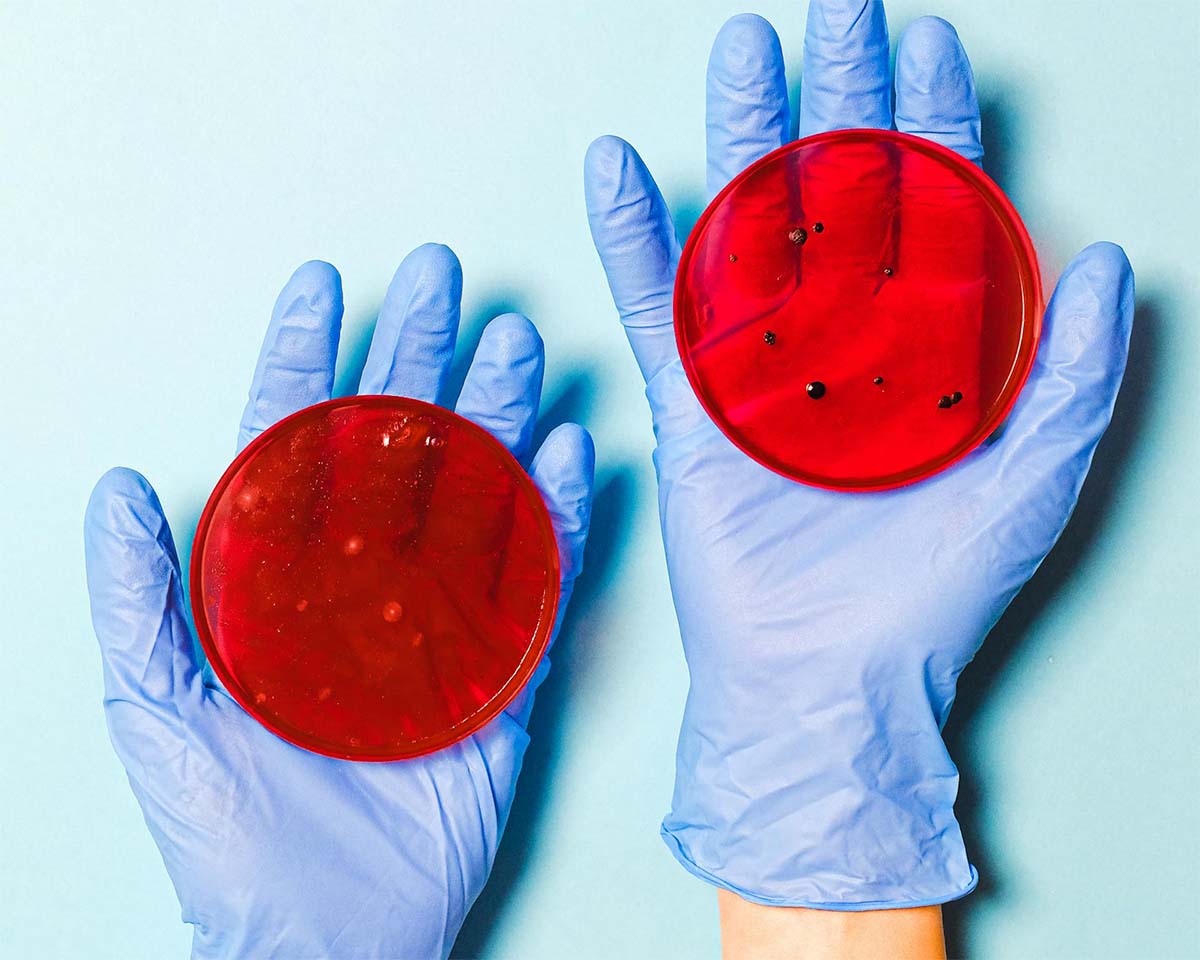
What’s the best brand? Nitrile gloves are used for so many different purposes that finding the best nitrile gloves brand depends on what you’re using them to do. Whether it’s heavy-duty machining work or getting through the lunch rush in the kitchen, gloves are tools, and different tools are helpful for different tasks.
All the gloves on this list are excellent choices for one circumstance or another. However, some are more comfortable and effective for some specific tasks. For nearly 30 years, our team at gloves.com has offered a wide variety of high-quality, affordable disposable gloves for all sorts of use cases.
We offer lowest price and fastest shipping guarantees. Orders over $99 always ship free, and if you want further savings, ask about our delivery subscription program that delivers the gloves you need before you need them — for even less than ordering them yourself.
If you’re trying to find the right pair of nitrile gloves for your needs, start by exploring our selection on gloves.com.

